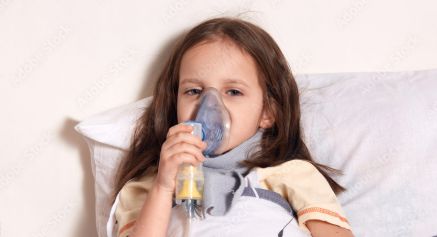One of the heartbreaking sights to watch as a parent could be your child/children gasping or trying hard to catch a breath. Analyzing the environment and surroundings to ensure that nothing causes your child to have another attack can also be nerve-wracking.
Although asthma remedies are available in conventional medicine, children with the problem may still have trouble sleeping and miss out on daily activities.
As a result, it stands to valid reason that many parents are eager to inquire with their doctors about the likelihood of their children growing out of this ailment.


Asthma is a chronic lung condition where the airways, or the tubes that carry air into and out of your lungs, are impacted and may swell up and narrow.
Wheezing, coughing, and chest tightness may result from this condition. An asthma attack flares up when the associated symptoms become worse than normal.
Many parents realize that to keep their children healthy, they must continuously watch over them to keep them away from anything that could cause an attack, like
- Pet dander
- Pollens
- Second-hand smoke
- Pollution and
- Weather changes.
Asthma Causes:
The root causes of childhood asthma are not fully known. Possible contributing factors include:
- Inherited susceptibility to develop allergies.
- Parents already having asthmatic issues.
- Some forms of airway infections at a relatively young age.
- Exposure to environmental elements like tobacco smoke or other air pollution.
As a result of the immune system’s heightened sensitivity, the lungs and airways expand and secrete mucus to specific triggers. These triggers do vary from child to child and include:
- Viral infections like the common cold
- Air pollutants exposure
- Allergies from dust mites, pollens, or molds
- Physical activities are being overdone.
- Changes in weather (Being too cold)
Asthma Signs and Symptoms in Children:


Many children start showing the symptoms much before the age of five. It is challenging to identify asthma symptoms in infants and toddlers as they are similar to that of a heat cold or other respiratory problems.
- Frequent coughs
- Rapid breathing
- Chest tightness
- Weakness or Tiredness
- Troubled breathing
- Reduced energy
- Wheezing
One or a few of these symptoms may be present in your child. It is common for symptoms to worsen at night, in the early morning, while exercising, or in response to other stressors.
Ways to Manage Childhood Asthma:
Most asthmatic children can regulate their symptoms, sometimes even to the point where flare-ups are infrequent. However, the most challenging aspect of asthma management is learning about it, including what triggers to avoid and when, medications, treatments, etc.
Taking care of your asthmatic children may seem like a daunting task. These measures will assist in making it simpler.
- Having a plan and following it:
The child should have an action plan for the ailment. Consult the homeopath for the plan and to get a detailed view about the medication advised, ways the triggers can be avoided, recognizing the flareups, and ways to manage them.
By adhering to this strategy, you will learn how to look after your child and when to seek assistance.
- Giving medicines as prescribed:
Most children with the asthmatic condition must take medication. These drugs aid in immunity building and prevent airways from being inflamed. The homeopath will recommend your child’s medications and how to administer them. They can be administered as a pill or liquid.
- Identify and avoid triggers:
Things that irritate the airways can act as triggers and cause an asthma attack. Allergens, including pollen and mold, climatic changes, and virus infections, are typical triggers (like the common cold).
Identifying your child’s triggers can take detective work, but the effort is worthwhile. The homeopath can also assist; for example, if you believe your child’s allergies are exacerbating their asthma, the homeopath may look into the problem.
When you are aware of your child’s triggers, try to steer them away from them as much as possible.
- Learn the signs of flare-ups:
After your child has experienced a few flare-ups, you might begin to anticipate when one will occur. A flare-up may be detected by early warning indicators hours or even days before noticeable symptoms (such as wheezing and coughing) appear.
- Know what to do during a severe flare-up:
Understand when your child’s symptoms require attention. Always keep medicines on hand in case your child becomes ill. Everyone who looks after your child should know when and how to provide the medication.
Homeopathic Ways of Treating Childhood Asthma:
Homeopathy is more effective and reliable when treating infants and children with asthmatic bronchitis. It functions by enhancing the child’s immune system and lung function. Homeopathy also affects the airways, which lessens inflammation and, in turn, the cough and shortness of breath.
Dr. Positive Homeopathy is the best way to give long-lasting remission from asthma, as most cases have genetic or inherited causes. The medications prescribed by the skilled medical professionals at Dr. Positive Homeopathy assist in enhancing the general well-being of the child troubled by the illness. The duration, severity, and frequency of asthma attacks determine how well the child can ultimately recover from their condition using homeopathic treatments.
Many parents later shared their success stories of how homeopathic treatment helped their children overcome asthma, and we at Dr. Positive Homeopathy were happy to be able to put a smile on their faces.
In this way, we have helped children attend school without interruption, paving the path for a bright future.
Contact Dr. Positive Homepathy to help your child have an asthma-free life ahead.
To schedule a consultation at your neighborhood Dr. Positive Homeopathy, Contact us at +91 7337557851.








